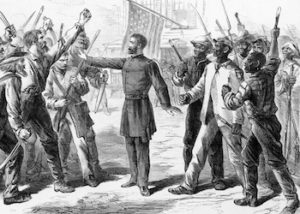
Freedman intervening image from Harpers Magazine 1866
*On this date, 1865, the Freedmen’s Bureau was formed. Its formal name was the Bureau of Refugees, Freedmen, and Abandoned Lands, an agency of the United States Department of War. It was to "direct such issues of provisions, clothing, and fuel, as he may deem needful for the immediate and temporary shelter and supply of destitute and suffering refugees and freedmen and their wives and children."
The Freedmen’s Bureau Bill was initiated by U.S. President Abraham Lincoln and intended to last one year after the end of the American Civil War during the Reconstruction period. Congress established the Bureau to provide practical aid to 4,000,000 newly freed Blacks transitioning from slavery to freedom.
Headed by Major General Oliver O. Howard, the Freedmen’s Bureau (as it was popularly called) might be termed the first federal welfare agency. Despite inadequate funds and poorly trained personnel, the Bureau constructed hospitals for more than 1,000,000 freed men and women, providing direct medical assistance to them. More than 21,000,000 rations were distributed to impoverished Blacks as well as whites.
Perhaps its greatest accomplishment was education; over 1,000 Black schools were built, and over $400,000 was spent establishing teacher-training institutions. All major Black colleges were either founded by or received aid from the Bureau. Less success was achieved in civil rights, for the Bureau’s courts were poorly organized and short-lived, and only the barest forms of due process of law for freedmen could be sustained in the civil courts. Its most notable failure concerned the land itself.
Thwarted by President Andrew Johnson’s restoration of abandoned lands to pardoned Southerners and by the adamant refusal of Congress to consider any form of land redistribution, the Bureau was forced to oversee sharecropping arrangements that inevitably became oppressive. In 1872, Congress abandoned the program, refusing to approve renewal authorizing legislation. It did not inform Howard, who had been transferred to Arizona by U.S. President Ulysses S. Grant to settle hostilities between Native Americans (Apache) and settlers. Grant's Secretary of War, William W. Belknap, was hostile to Howard's leadership and authority at the Bureau. Belknap aroused controversy among Republicans by his reassignment of Howard.
The World Book Encyclopedia.
Copyright 1996, World Book, Inc.
ISBN 0-7166-0096-X